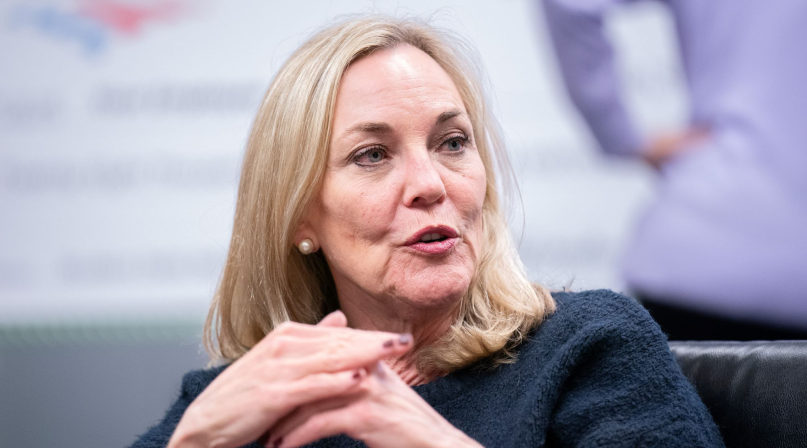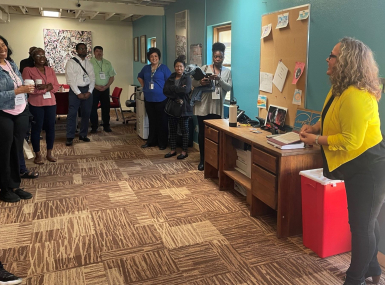Commission co-chairs discuss how counties can better treat mental health

The timing is right to change the way mental health is treated in America.
That’s what Kathryn Barger sees. And as someone who has worked in county policy over the decades, first as a policy aid and now as a Los Angeles County, Calif. supervisor, she has seen public perception shift in that direction.
“I see change over the last few years in the fact that people are recognizing that the status quo is not working,” she said. “Twenty years ago, in the state of California, you could have gotten very little traction to change any laws, let alone the basic definition of ‘gravely disabled.’ As we’ve come out of COVID, people are now recognizing that mental health and the services need to be really rethought [as well as] how we are providing them.”
Barger and King County, Wash. Executive Dow Constantine serve as co-chairs of the NACo Commission on Mental Health and Well-being. Constantine said that the shift in public perception couldn’t come fast enough.
“We have to understand that what we see in the jail or in the streets is just the tip of the iceberg, that there’s profound suffering happening in every community and we have an obligation to step up and do everything that we can to help people take that challenge on,” he said.
What they’ve heard from constituents has helped shape their understanding of how mental health challenges have affected their communities. Constantine said he has seen mental illness challenge families despite plenty of resources.
“If people with all of those supports, surrounded by family and high-functioning networks of people, are not able to take advantage of the help that’s available, you know, what chance does someone without those advantages have?” he asked.
Barger hears from constituents what seems at first like a counterintuitive response.
“I’ve talked to family members who are relieved when their loved one gets arrested, because at least they know where their loved ones are at night and they’re not going to get the phone call from the coroner,” she said.

Both Barger and Constantine said they identify co-occurring substance use disorders as complicating issues.
“Fentanyl is a real major challenge,” Constantine said. “We do a lot of interdiction, but it’s hard because fentanyl is very compact.”
Barger sees complications mount when people self-medicate.
“The drugs on the street are so potent and are creating psychosis and are taking the mental illness to a whole new level, whether it be in L.A. with meth, which makes them a lot more violent, a lot more agitated, or oxycodone, which makes them a lot more mellow, but either way, it’s creating another layer of difficulty to address those who are facing mental illness,” Barger said. “Many of them are disguising the mental illness through drug use and that’s what’s changed. Once you get someone clean, then their psychosis starts to show up and then you start to figure out how to treat both layers.”
The NACo commission aims to:
- Amend exclusionary policies under Medicaid, through which residents lose their Medicaid eligibility before they are adjudicated
- Enforce mental health parity, reconciling disparities in the coverage of mental health and substance use disorders under both public and private health insurance plans
- Build and support the mental health workforce
- Build and enhance local crisis response systems
Both co-chairs’ counties have enacted policies to address needs for local crisis response systems.
King County’s Crisis Care Centers levy is raising $1.25 billion to build a network of centers for people who are in crisis, where they can stay for 23 hours or stay for two weeks and be able to start on the road to recovery.
“It is increasing the number of treatment beds that we have in the community and relieving the most important bottleneck by bringing that next generation of behavioral health workers, one that is representative and reflects the communities we’re trying to serve,” Constantine said.
Los Angeles County expanded its mental evaluation team, which pairs law enforcement with clinical psychologists or clinical technicians, who go out on calls.
“In those situations, less than 1% end up being jailed,” Barger said. “They’re able to triage and either de-escalate or refer them to services and not have to take someone and arrest them.
“These types of programs (pairing law enforcement with clinical psychologists or clinical technicians) are important because law enforcement knows how to enforce the law, they’re not trained in what to do when someone is having an episode, so I’m very proud of that.”
They hope to find a better source of funding than property taxes.
“Any time we need to respond to a challenge in the community, it means relying on one of these profoundly imperfect revenue sources,” Constantine said.
“We, as a country, need to resolve to take on mental health and addiction the way we’ve taken on regular challenges … and not continue to sweep it under the rug as we have over the generations,” he added.
“Government alone is not going to fix this,” Barger said. “I think it’s important to recognize that we play a vital role, but it’s nonprofits, it’s partners from across the spectrum, the National Alliance on Mental Illness that need to be at the table to help us better find solutions, because while I know from a government standpoint how the system works, it sometimes does not always translate into that when you are in real time trying to access services.”
Resource
NACo Commission on Mental Health and Wellbeing: Reimagining the Advancement of Mental Health Support Through Policy Reform

Featured Initiative
NACo Commission on Mental Health and Wellbeing
Launched in February 2023, the NACo Commission on Mental Health and Wellbeing brings together county leaders from across the nation to take action to address the ever-growing mental health crisis from the county government perspective.

Related News

Bernalillo County empowers youth through community-based services
Bernalillo County, N.M.'s funding has allowed a drop-in center to cater to young people's needs while giving them an added sense of security.


